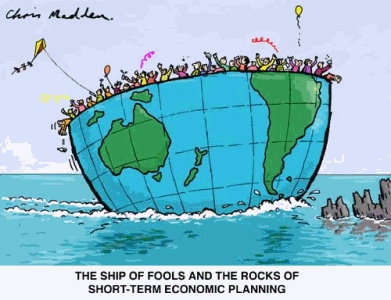
Allgemeine Arbeitshinweise
Ihre Arbeitszeit (einschließlich der Zeit für Lesen und evtl. Auswählen von Aufgaben) beträgt 210 Minuten.
Erlaubte Hilfsmittel:
- Ein- und zweisprachige Wörterbücher
- Wörterbuch der deutschen Rechtschreibung
Teil A: Text
Your Planet: How you can save it
[…] We have been conditioned to think that progress is necessarily about doing things – spending money,
going to places and acquiring things. But being green is as much about not doing as about doing.
It doesn’t mean wearing a hair shirt, or giving up all the material things we love best. On the contrary:
being truly green saves money and enhances your quality of life in countless ways. Even if you can’t
afford organic vegetables and don’t know the first thing about solar panels, you can get way ahead of
the pack – and save money – simply by making often tiny adjustments to your daily life.
Small actions such as putting on an extra sweater instead of turning up the heating, switching off
lights, lagging the hot water tank to conserve heat, switching your electrical appliances off at the
mains, reducing meat consumption, drying your clothes outside rather than using the tumble-drier (
a quick solar solution!), and avoiding buying unnecessary, expensive and over-packaged goods will
help the planet, your health and your finances. […]
I live in west London, on the King’s Road: a retail paradise for the capital’s most ardent shopaholics.
Every weekend I see the same couples, laden with bags of clothes, gadgets and this week’s most talked-about
pair of jeans. A hundred years ago they would have been in church or fulfilling some quite possibly tedious
filial duty, or going about the then hugely laborious business of keeping themselves warm, clean, dry and
fed. While we may feel it’s a good thing that the chores, religious dogma and family obligations have
disappeared, the resulting void has in many cases simply been filled by an obsession with materialism. […]
I recently replaced my car with a bike. Not only has this reduced my carbon emissions but I am lighter and
brighter now the hideous responsibilities of car ownership – the admin, the bureaucracy, the tickets
and fines –are in the past. Running a car was such a strain I would have sold it even if it wasn’t the
green thing to do.
Attempts to cycle have not been successful. My first journey left me a nervous wreck, and I was secretly
relieved when the gears broke. The bike is currently languishing outside my flat, waiting to get fixed
(I’m in no great rush), which means I’m reliant on walking, public transport or cabs. But this is still
more eco-friendly than running a car. […]
None of us is perfect. I will gloss quickly over my Bang & Olufsen sound system that can’t be turned
off at the mains and the huge Maytag fridge (with gas-guzzling cappuccino-making attachments). But as
I said, we are all at different levels of the eco ladder, and if I’d known then what I know now I
wouldn’t have installed them in the first place.
Ripping them out wouldn’t be environmentally friendly, and green living unfortunately involves a
degree of compromise. The real question to answer is: are you going to think about such questions,
or are you going to continue to live in a state of denial?
It is easy for ordinary people to feel powerless in the face of environmental destruction. But our own
environments – our home, school, hospital, street, garden – are the few places over which we as
individuals do have some control. What we buy (or don’t buy); what we wear, eat, drink; how we travel,
clean our house and treat the soil in our garden – all these choices have a huge impact not just on our
health but on the planet’s, too.
So: in the spirit that it is better to light a candle than curse the darkness I will continue to do my
imperfect bit and encourage my friends and those who read my columns to do the same. The Good Life here
we come!
(642 words)
Abridged from:
Julia Stephenson, Your Planet: How you can save it, The Independent (Online Edition), 20 September 2005.
Quelle
Annotations:
hair shirt – uncomfortable shirt worn by some Catholics and by Jews as a sign of penance
The Good Life – very popular British sitcom of the late 70s about a family living an alternative lifestyle
A Text production
A 1 WORKING WITH THE TEXT
Answer in complete English sentences.
1.1 Summarise what the text reveals about the author.
1.2 Describe the author’s concept of “being green”. (l. 3)
1.3 Analyse how the author tries to catch and keep the reader’s attention.
Inhalt:
A 2 COMPOSITION
Choose one of the following topics:
2.1 Write a letter to the editor discussing the author’s argumentation.
2.2 Interpret the cartoon.

Bildquelle
2.3 “ … we may feel it’s a good thing that the chores, religious dogma and family obligations have
disappeared, …” (ll. 21 – 23)
Discuss
Teil B: Translation
Saving the Planet Without Costing the Earth
In Saving the Planet Without Costing the Earth –500 simple steps to a greener lifestyle*author Donnachadh
McCarthy lays out the case for urgent environmental action in a whole range of areas from home maintenance
to your workplace and from reducing waste to tackling energy use.
He relates his own experience in making his lifestyle more planet-friendly in each area, which helps
bring the global arguments down to an accessible human level. […]
Donnachadh has set a clear example in his own life with his own home inPeckham being the first private
house in London to sell solar electricity to the national grid. His home is also the first home
in London to receive planning permission to install a grid-connected domestic windmill and over
75% of his water needs are supplied by a rain harvester on his roof. […]
(148 words)
* title to be translated
Quelle
|

